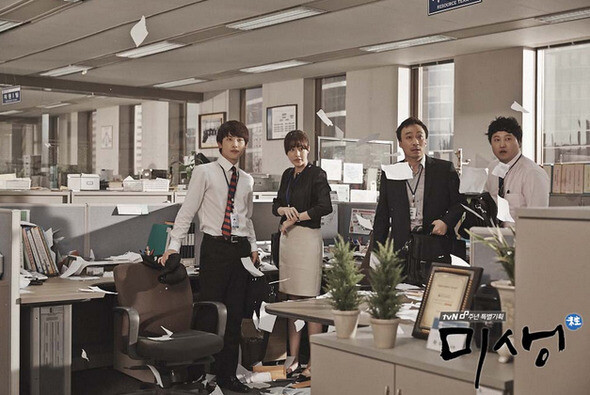hankyoreh
Links to other country sites 다른 나라 사이트 링크
Instead of learning, interns exploited as a pool of cheap labor

Last year, a university student identified by the surname Kim, 24, spent two months “interning” at an art museum in Seoul. Early on, he had hoped to be able to use his major background and learn about exhibition work. The reality was quite different. There was no intern supervisor or educational program, Kim said. Instead, over 90% of his duties involved chores like cleaning and washing dishes.
“I wasn’t learning anything,” Kim recalled. “It felt like I was there for volunteer service. After I finished my internship, I was physically and mentally wiped out.”
Another student, Park, who is in her twenties, said she learned almost nothing about public relations while interning for the publicity team at a local film festival.
“My ‘mentor’ worked for the planning team. They didn’t really know anything about PR, so even when I had questions I couldn’t get any proper instruction,” Park recalled.
“I started interning thinking I would earn 700,000 won (US$640) a month, but they only paid me 400,000 won (US$370),” she added.
Many similar stories of the tearful reality facing “interns” exploited as cheap labor were shared at a “young workers’ transitional labor testimonial meeting” staged by the Youth Union on Jan. 28 at the National Assembly Hall in Seoul’s Yeouido neighborhood.
The term “transitional labor” used by the Youth Union refers to trainee (trial) and intern (education/practical training) work. Trainees are protected by Labor Standards Act terms regarding minimum wage, severance pay, and rest time. Interns, who typically go to work at other companies after a brief training period, are generally not considered workers.
Although the positions are presented as “internships,” companies often give interns the same duties as trainees and trial employees.
“If you look at past Supreme Court decisions, they see trainees - including interns - as workers subject to the terms of the Labor Standards Act if they provide work for the company and continue receiving the employer’s orders to perform duties,” explained labor attorney Lee Sang-hun.
Youth Union leader Kim Min-su called for “recognition of the reality that there is an intermediate stage of ‘transitional labor’ between university and other education and entering the labor market.”
“Instead of telling young people who are faced with the harsh conditions of transitional labor to just tough it out and try their best, we need institutions in place to provide support with education and training so they can successfully enter the labor market,” Kim said.
By Kim Kyu-nam, staff reporter
Please direct questions or comments to [english@hani.co.kr]

Editorial・opinion
![[Column] Season 2 of special prosecutor probe may be coming to Korea soon [Column] Season 2 of special prosecutor probe may be coming to Korea soon](https://flexible.img.hani.co.kr/flexible/normal/500/300/imgdb/original/2024/0426/3317141030699447.jpg) [Column] Season 2 of special prosecutor probe may be coming to Korea soon
[Column] Season 2 of special prosecutor probe may be coming to Korea soon![[Column] Park Geun-hye déjà vu in Yoon Suk-yeol [Column] Park Geun-hye déjà vu in Yoon Suk-yeol](https://flexible.img.hani.co.kr/flexible/normal/500/300/imgdb/original/2024/0424/651713945113788.jpg) [Column] Park Geun-hye déjà vu in Yoon Suk-yeol
[Column] Park Geun-hye déjà vu in Yoon Suk-yeol- [Editorial] New weight of N. Korea’s nuclear threats makes dialogue all the more urgent
- [Guest essay] The real reason Korea’s new right wants to dub Rhee a founding father
- [Column] ‘Choson’: Is it time we start referring to N. Korea in its own terms?
- [Editorial] Japan’s rewriting of history with Korea has gone too far
- [Column] The president’s questionable capacity for dialogue
- [Column] Are chaebol firms just pizza pies for families to divvy up as they please?
- [Column] Has Korea, too, crossed the Rubicon on China?
- [Correspondent’s column] In Japan’s alliance with US, echoes of its past alliances with UK
Most viewed articles
- 1‘We must say no’: Seoul defense chief on Korean, USFK involvement in hypothetical Taiwan crisis
- 2[Column] Season 2 of special prosecutor probe may be coming to Korea soon
- 3N. Korean delegation’s trip to Iran shows how Pyongyang is leveraging ties with Moscow
- 4Amnesty notes ‘erosion’ of freedom of expression in Korea in annual human rights report
- 5Korea sees more deaths than births for 52nd consecutive month in February
- 6[Reportage] On US campuses, student risk arrest as they call for divestment from Israel
- 7[Editorial] New weight of N. Korea’s nuclear threats makes dialogue all the more urgent
- 8‘Weddingflation’ breaks the bank for Korean couples-to-be
- 9Division commander ordered troops to enter raging flood waters before Marine died, survivor says
- 10[Editorial] Korea’s surprise Q1 growth requires objective assessment, not blind fanfare